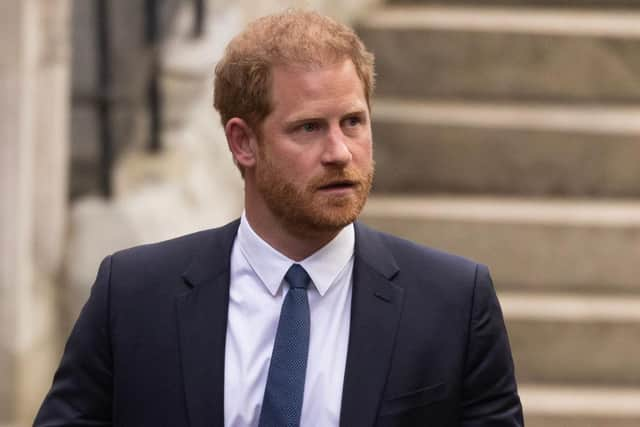Prince Harry: phone hacking court case explained - was there a secret agreement between NGN and Royal Family?


In recent months, the Duke of Sussex has been engaged in six legal disputes at the High Court.
Harry's civil litigation involves filing lawsuits against three prominent newspaper publishers, accusing them of engaging in unlawful information gathering. Additionally, he has initiated legal actions against the Home Office regarding matters concerning his personal security.
Advertisement
Hide AdAdvertisement
Hide AdThe duke has appeared in court in London this week for his case against the publisher of The Mirror. In April, he was in court for the lawsuit he and actor Hugh Grant have filed against NGN, the publisher of The Sun and the now-defunct News Of The World, alleging unlawful information gathering. Here is everything you need to know about it.
What’s going on with the NGN lawsuit?
The duke claims that journalists and private investigators working for the papers specifically targeted him. During a preliminary hearing in April, the publisher requested that the judge dismiss both Harry and Grant's claims, arguing that they were filed too late.
In a ruling earlier this month, Justice Fancourt determined that Grant's claim could proceed to trial, with the exception of any allegations related to phone hacking. Harry's legal team argues that NGN's challenge to his claim is an attempt to undermine a supposed "secret agreement" between the royal family and the publisher, which the duke was made aware of in 2012.


The High Court in London heard this alleged agreement prevented the duke and the Prince of Wales from bringing phone hacking claims against the publisher at the time. However, NGN has denied Harry’s claim that there was an agreement.
Advertisement
Hide AdAdvertisement
Hide AdIn his witness statement, the duke alleged that it was agreed that royals would bring claims at the end of a series of cases about phone hacking and their cases would be resolved without trials.
Harry said: “My brother and I were also told by either the institution’s solicitor, or someone else from the institution, that there was no possibility of either of us bringing a claim against NGN for phone hacking at that time.
“The rationale behind this was that a secret agreement had been reached between the institution and senior executives at NGN whereby members of the royal family would bring phone hacking claims only at the conclusion of the mobile telephone voicemail interception litigation and at that stage the claims would be admitted or settled with an apology.”
Why would a ‘secret agreement’ be in place?
Harry claimed the agreement was to avoid having a member of the royal family going into a witness box and describing the “private and highly sensitive voicemails” that had been intercepted. Harry said the voicemails had been intercepted by Clive Goodman – who had worked at the News Of The World.
Advertisement
Hide AdAdvertisement
Hide AdHe continued: “The institution was incredibly nervous about this and wanted to avoid at all costs the sort of reputational damage that it had suffered in 1993 when The Sun and another tabloid had unlawfully obtained and published details of an intimate telephone conversation that took place between my father and step-mother in 1989, while he was still married to my mother.”
Harry later said that the alleged agreement “including the promises from NGN for delayed resolution was, obviously, a major factor as to why no claim was brought by me at that time”. The duke also said: “To say that I was frustrated and disappointed would be something of an understatement.”
His barrister, David Sherborne, said in written submissions that “discussions and authorisation” from the royal family over the agreement included the late Queen and two of her private secretaries, as well as private secretaries for both William and Harry.
However, Anthony Hudson KC, for NGN, said the duke’s allegation that there was a secret agreement is “flatly inconsistent” with other parts of his case.
Advertisement
Hide AdAdvertisement
Hide AdHe said in written submissions: “The allegation that the Duke of Sussex was told of such an agreement in around 2012 flies in the face of a contention that, by the same date, he lacked knowledge of facts sufficient to identify a worthwhile claim or to justify embarking on the preliminaries to a claim.”
Hudson said Harry has a “belated reliance on the asserted, unpleaded secret agreement between the institution and NGN”. He continued: “This delay is matched by the extreme vagueness with which the circumstances of the secret agreement are described in the Duke of Sussex’s evidence.”
The barrister said that Harry did not say in his evidence who made the agreement, who it applied to, when it was made, or a date when it was meant to expire.
Hudson added: “The account notably contains no explanation as to how it is said that the Duke of Sussex could have been made party to such an agreement without having had any prior knowledge of it, and thus no ability to confer authority or instructions upon anyone to enter into the agreement on his behalf.”
What happens next?
Advertisement
Hide AdAdvertisement
Hide AdNGN, which denies engaging in any unlawful activities at The Sun, disputes the existence of such an agreement. Justice Fancourt will hold another hearing in July to determine whether Harry's case can be amended to include his claims regarding the secret agreement. A judgment on Harry's case is expected to be delivered later this year.
If NGN loses its application and the case goes to a planned trial in January, senior News Group executives Rebekah Brooks and Robert Thomson “who were involved in the secret agreement and subsequent negotiations” will have to give evidence.
From our sister title PeopleWorld: Prince Harry becomes first royal in 130 years to give evidence in court
Comment Guidelines
National World encourages reader discussion on our stories. User feedback, insights and back-and-forth exchanges add a rich layer of context to reporting. Please review our Community Guidelines before commenting.
